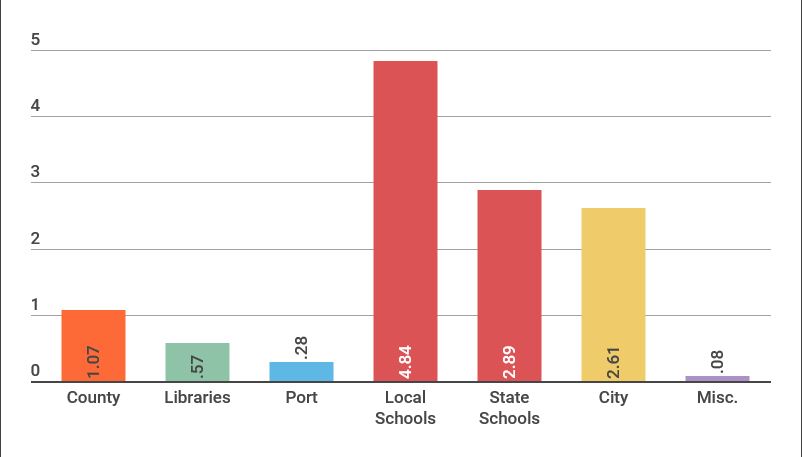Dear Friends and Neighbors,
A debate is under way here at the Capitol about reducing your property taxes. I am hopeful that it will lead to what amounts to a tax rollback. This discussion will probably continue until the closing days of the legislative session. Here is some background to put the situation into perspective.
***
Property taxes are up this year across the state. This is partly because the Legislature agreed in 2017 to increase the state portion of the property tax that pays for education. It was a bipartisan decision that will bring state government back into compliance with our constitutional responsibility to fully fund basic education.
Before that decision became final, I had favored lowering local school-levy taxes for 2018 to offset the increase in the state property tax. A majority in the Senate agreed, but a majority in the House of Representatives did not. The compromise we reached was to allow local levy collections to continue one more year before a cap on local levy rates (a limit of $1.50 per $1,000 assessed valuation) goes into effect. This means property taxes will fall in 2019 for the vast majority of property owners.
In the meantime, there is a spike for this year in the combined property tax associated with schools.
Again, the increase reflected on property tax statements is only partly due to the education-funding changes adopted by the Legislature. Rising property values and other voter-approved tax levies also drive up property taxes.
***
Property owners in our legislative district have been paying the same state education levy but different local levies, depending on school district.
on school district.
One of the goals of the Legislature’s education reforms is to make a consistent state investment in the basic education of each Washington student regardless of ZIP Code, and limit the use of local levies to spending on “enrichment” programs and activities that are outside the definition of basic education.
Here is what the change in levy rates means, using the Evergreen School District as an example.
Officially, the state portion of the property tax for schools increased by $0.81/$1,000 of assessed property value. However, the actual rate varies slightly across Washington’s 39 counties because different assessors use different methodologies.
Property taxes for a median-value home in the Evergreen School District are $371 higher in 2018 than in 2017 (median value is different than average value; “median” means half the properties are valued higher, half are valued lower). Of that total, $330 is attributable to changes in education funding, but it’s not actually that simple. The $330 also reflects the fact that the median value of homes in the Evergreen SD is projected to increase from $253,000 in 2017 to $275,000 in 2018. That means $200 of the overall $371 increase is actually attributable to the increased state rate the Legislature approved.
The bottom line: roughly 60% of the overall property tax increase in the Evergreen School District is a result of the increased state property tax rate. That’s an important number to remember should you hear people suggest the entire property tax increase is due to the Legislature’s action. The math simply doesn’t support that claim.
Now let’s look at what the $1.50/$1,000 cap that takes effect in 2019 means in the Evergreen SD.
 *adjusted upwards according to state Department of Revenue factoring
*adjusted upwards according to state Department of Revenue factoring
The actual dollar amount will vary depending on future home valuations, but even if the median value home in the Evergreen School District increased to $285,000 in 2019, the owner of a median-value home would still see a tax cut of approximately $100 from what they paid in 2017 (meaning next year’s taxes would be lower than last year’s, for education). This would be carried out beyond 2019 into 2020 and 2021 (even if the median value goes up more than $30,000 from 2017 to 2019).
***
The Legislature can — this year — reduce property taxes for 2018
The state economy has been growing stronger over the past few years, as Senate Republicans continued to hold the line on tax rates. Based on impartial, non-partisan forecasts issued in September and November, the amount of tax revenue coming into the treasury was expected to be at least $1 billion ahead of earlier expectations.
The first quarterly forecast of 2018, released late last week, is another $1.3 billion beyond expectations. The three forecasts together, plus an estimated $90,000 savings in demands for state services, mean the Legislature has access to more than $2.4 billion that wasn’t available when we approved the new education-funding approach.
The new Senate majority has proposed a tax reduction, but it would not take effect until 2019 and would total only about $93 on a $300,000 home.
We can and should do better before the legislative session ends March 8. There is enough additional revenue based on the past three forecasts to effectively roll the 2018 school-tax spike back in its entirety. One way to accomplish that is by passing Senate Bill 6525, a bill I am co-sponsoring. It would reduce local levies this year (eliminating the spike) and push additional state revenue to districts.
Another approach is Senate Bill 6439, which would provide a one-time, $1 billion reduction in property taxes, restoring this year’s state levy to last year’s levels and deferring the state increase to 2019, when local levies will be lower. For a $300,000 home, either of these approaches represents a $240 savings – real relief compared to the new Senate majority’s $93.
I will be working hard to make property tax relief a reality this year, but I need your help. Click here to create an e-mail to the Senate and House budget committees and tell them you deserve complete property tax relief this year.
Yours in service,












